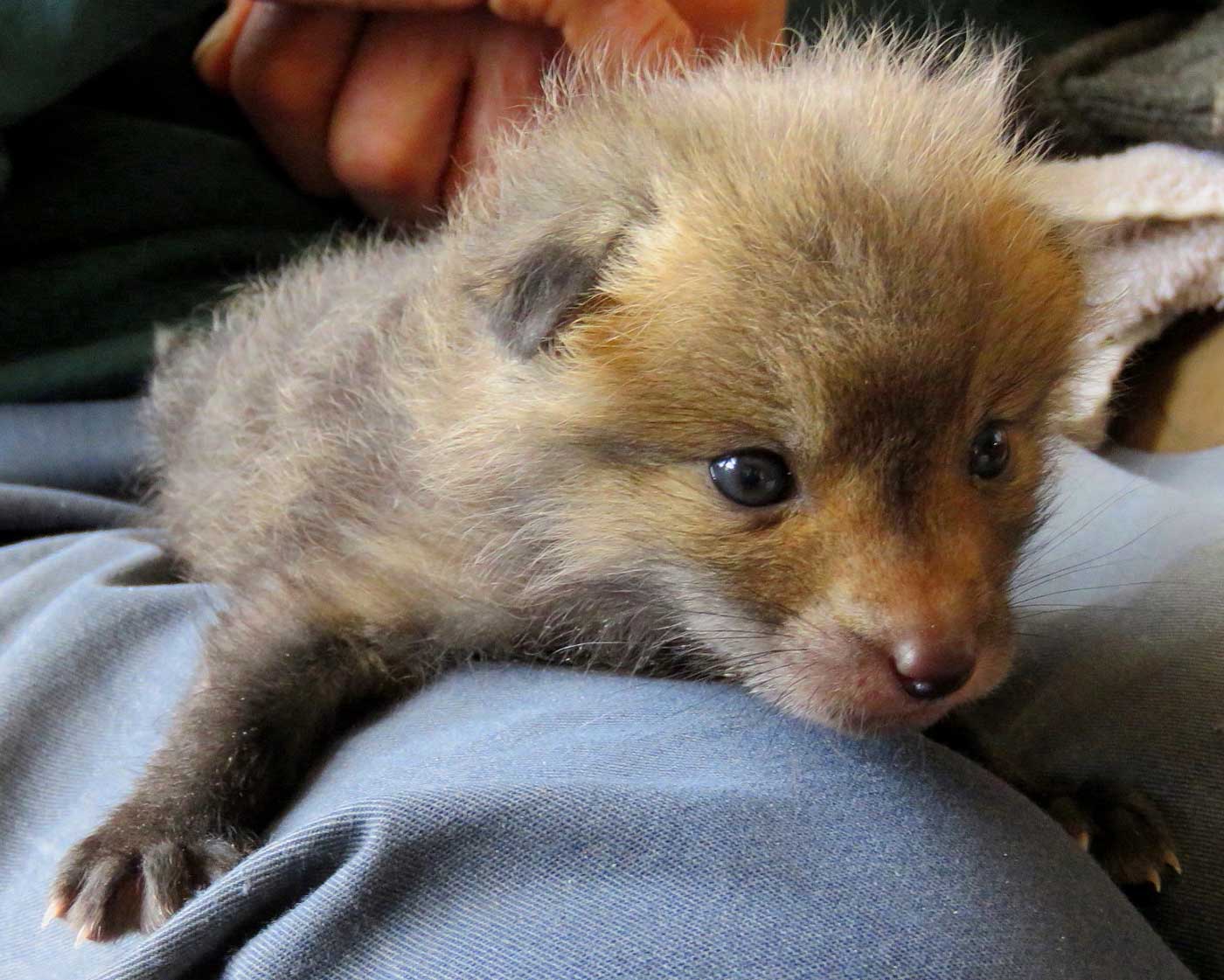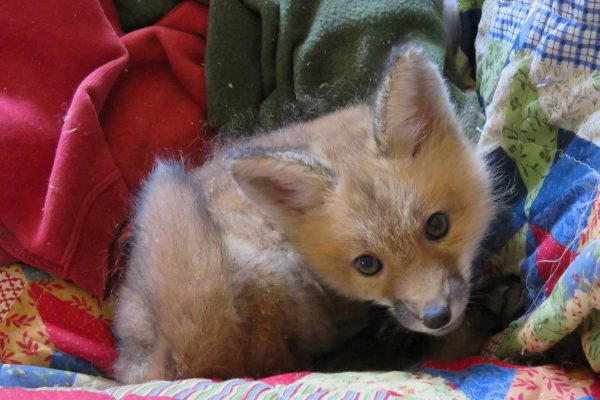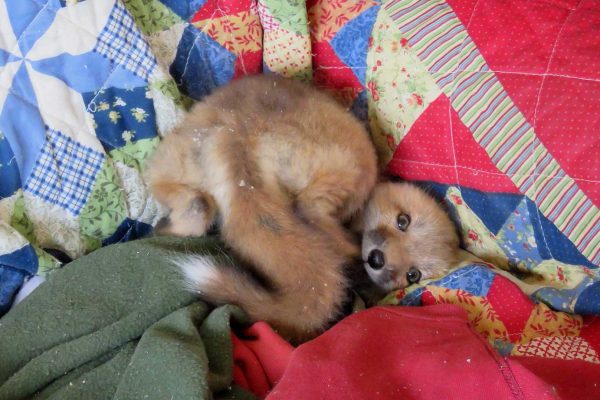
This photo of the fox kit was taken on April 16, 2023. Photo by Jayne Winters
In mid-April, I got a call from Don at the Duck Pond Wildlife Rehab Center, asking if I still wanted to take pictures of a “little red.” I’m always up for a photo opportunity, especially of young critters, so I headed over expecting to see a baby red squirrel in one of the incubators. When I arrived, however, the incubators were empty and Don pointed to a plastic pet carrier in the living room. I peeked inside and looked into the sweetest face of a tiny fox kit!
Her background story was, of course, sad. She had been found by the side of the road in the Belfast area; Don suspected the mother fox had been moving her litter to a new den and, at some point in crossing the road, was startled by a car and dropped this little girl. He guessed her age to be about four weeks old. The plaintive cries coming out of the carrier were truly heartbreaking; l assumed she was missing her litter mates and scared of being in a strange place with humans. As soon as I opened the latch, she popped right out for her photo shoot and became interested in her new surroundings.
Like most red fox kits, “our” little girl has soft fuzzy fur, mostly gray, except for a white tip on her tail. When I visited last week, she was very playful and active, apparently thriving under adoptive parental care. Wild animals have higher metabolisms and different nutritional requirements than a domestic kitten or puppy, so it’s important to provide the right type of fat and protein. She’s currently being fed a mixture of canned dog food and milk replacement, four times a day. Even as an adult, she would not be fed dry food as it has too much ash, which can cause kidney stones or even death. Foxes are canines, closely related to wolves and dogs, so should not be fed pork, cat food, or anything toxic to dogs, like chocolate or grapes. As she gets older, she’ll be gradually transitioned to all canned dog food, with occasional raw chicken as a treat. Don is also treating her for mites, as she has evidence of bites under her fur, and he wants to ward off mange.

This photo was taken on May 17, 2023. Photo by Jayne Winters
Don was hoping another kit would be admitted so that the two of them could share a pen outside, once they’re a bit bigger and the weather warms up (especially overnight). Last week, a second fox kit was rescued, but he’s larger and wary (which is a good thing), not good roommate material at the moment. It’s likely there will be more kits brought to Duck Pond in the upcoming weeks, so hopefully “Little Red” [my name for her] will bond with one or more of them.
The goal of rehabbing is to not only rescue and nurture injured and/or abandoned animals, but to return them to the natural environment where they belong. I asked Don how younger kits are “trained” to hunt so that they can be successfully returned to the wild. Not to my surprise, it’s a difficult task. Over time, dead mice will be put in the outside pen, hidden in hay or under brush, so that the kits can “hunt” for their food. Their survival in the wild depends on their ability to fend for themselves and avoid human contact. It’s hard to maintain minimal contact with the very young animals when you have to feed them frequently (often with a bottle) and provide health care. The sooner “Little Red” can be outside the carrier, out of the house, and in the natural outside elements, and with others of her kind, the better her chance for successful release.

The fox kit in its “playful puppy” stage, enjoying being playful for the camera. Photo by Jayne Winters
Spring is officially here and there are signs of new life everywhere, from plants and flowers starting to bloom to birds nesting and of course, more calls coming in to Duck Pond about orphaned or injured critters. Don, Jane, and Debbie are certainly keeping busy! Some rescues are still being transferred to other rehabbers who are helping to keep critter care at Duck Pond manageable. Please check the following web sites to see if there is a rehabber near you: www.mainevetmed.org/wildlife-rehabilitation or www.maine.gov/ifw/fish-wildlife/wildlife/living-with-wildlife/orphaned-injured-wildlife/index.html. Donald Cote operates Duck Pond Wildlife Care Center on Rte. 3 in Vassalboro. It is a nonprofit, State-permitted rehab facility, which is supported by his own resources and outside donations. Mailing address: 1787 North Belfast Avenue, Vassalboro ME 04989 Phone: (207) 445-4326. Please note that the prior wildlifecarecenter email address is not being monitored at this time.
—by Jayne Winters, Natural Resources Council of Maine member from South China, Maine
Critter Chatter also appears monthly in the Town Line newspaper.












So informative and beautifully written article.
Photos are so cute. You certainly took your time waiting for the right shots of “Little Red”